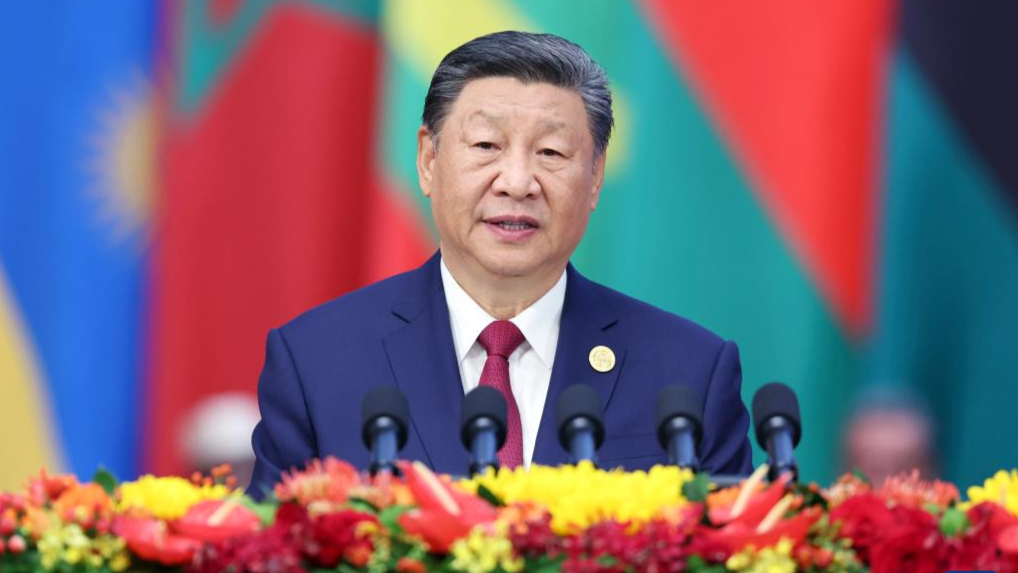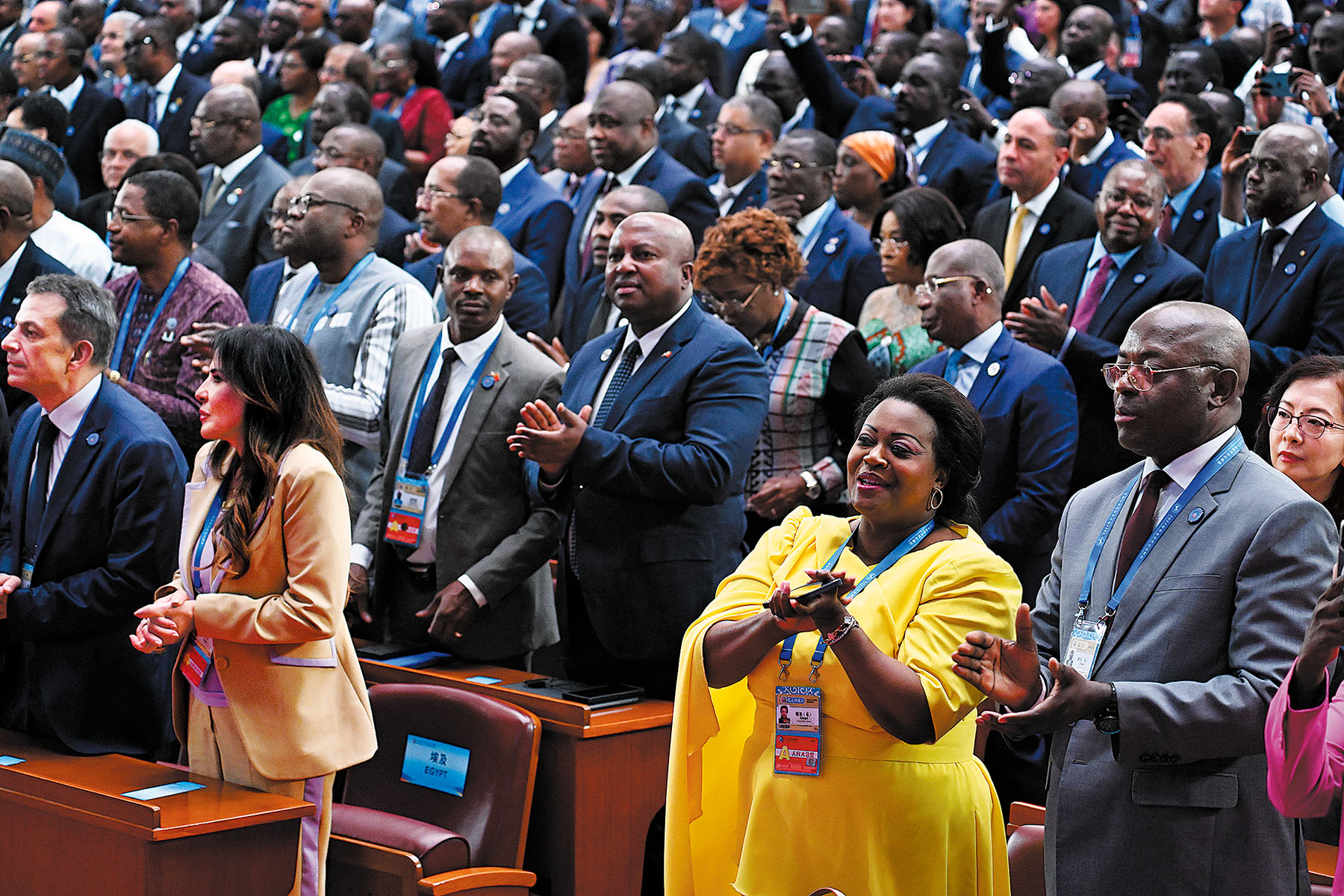President’s action plan to advance modernization shows China’s commitment to Africa, experts say

International observers have lauded President Xi Jinping’s keynote speech at the opening ceremony of the 2024 Summit of the Forum on China-Africa Cooperation in Beijing, saying that it was a demonstration of a renewed impetus in the deepening relationship between China and Africa.
Xi’s pledge to work with Africa to implement the 10-point partnership action plan to advance modernization reaffirmed China’s commitment to Africa, the experts said, noting the speech also depicted China as a reliable development partner for the continent.
Xi said in the Sept 5 speech that China and Africa’s joint pursuit of modernization will set off a wave of modernization in the Global South and open a new chapter in the drive for a community with a shared future for mankind.
He proposed that bilateral relations between China and all African countries with diplomatic ties with China be elevated to the level of strategic relations.
He also proposed that the overall characterization of China-Africa relations be elevated to an all-weather China-Africa community with a shared future for the new era.
Antonio Guterres, secretary-general of the United Nations, highly commended China-Africa relations. “The China-Africa partnership is a pillar of South-South cooperation,” he said on social media. “Today in Beijing, I stressed the UN’s commitment for this cooperation and the deep reforms the global financial architecture needs to ensure development leaves no one behind.”
Deniz Istikbal, a researcher at the Foundation for Political, Economic and Social Research in Turkiye, said Xi’s speech reflects a deepening and evolving China-Africa relationship.
“By proposing that China’s relations with African countries be elevated to strategic relations and positioning it as an all-weather China-Africa community with a shared future for the new era, China is emphasizing a long-term, resilient, and multifaceted relationship,” Istikbal said.
He said President Xi’s modernization proposals indicate China’s intention to solidify its role as a major partner for Africa in global affairs, while deepening the relationship as one built on mutual respect, trust, and long-term collaboration.
“The summit highlighted the strategic importance that China places on its relationship with Africa, which is distinct from the Western approach,” he said.
Dennis Munene, executive director of the China-Africa Center at the Africa Policy Institute in Kenya, said Xi’s remarks exemplified the true principles of sincerity, real results, amity, and good faith.
“Delivered with a focus on mutual respect and shared benefits, Xi’s speech reignited the dream of an African renaissance,” he said.

To ensure that Africa experiences true modernization, President Xi unveiled 10 partnership action plans to revolutionize bilateral and multilateral China-Africa cooperation, Munene said.
X.N. Iraki, an associate professor at the University of Nairobi’s Faculty of Business and Management Sciences, said the speech focused on the key issues.
He said the statements in Xi’s speech, such as “modernization is an inalienable right”, and “well-balanced material and spiritual advancement is a lofty objective of modernization”, show that China understands Africa.
Jack Perry, chairman of the 48 Group Club and the CEO of the London Export Corporation, said his company sees the future plans as stated in President Xi’s speech as the stimulus for fresh growth and innovation, addressing global poverty and producing sustainable development.
Carlos Lopes, a professor at the University of Cape Town’s Nelson Mandela School of Public Governance, said the significance of Xi’s speech lies in its ability to consolidate Sino-African interests in defense of multilateralism.
He said the focus on green transition, digital advancement and technological transformation signals a strategic shift toward sustainable and modern growth paths.
Shakeel Ahmad Ramay, CEO of the Asian Institute of Eco-civilization Research and Development in Pakistan, called the speech a ray of hope for African people amid challenging times.
He said President Xi has proposed a way to assist Africa in solving the problems of poverty and food insecurity, improve healthcare, and pave the way for a peaceful, prosperous, and future-oriented society.
Ramay said the partnership action plan is designed to be inclusive and respect diversity in governance systems, cultures, and preferences, ensuring that all African nations are considered and respected in the partnership.
Alex Vines, director of the Africa program at the Chatham House think tank, lauded the 10 priority areas of the action plan including health, agriculture, employment, and security, saying they are all important for Africa.
China pledged 360 billion yuan ($50.7 billion) of financial support to Africa over the next three years, higher than the amount pledged at the 2021 FOCAC Summit. Vines said the increase is good news for the continent.
Michael Borchmann, former director-general for international affairs of the German state of Hessen, said he was impressed by President Xi’s words that “the friendship between China and Africa transcends time and space, surmounts mountains and oceans and passes down through generations”.
Citing examples of African nations helping the People’s Republic of China restore its lawful seat in the United Nations in the early 1970s, and China helping to build the Tanzania-Zambia Railway, Borchmann said, “There are many examples of close and fruitful cooperation, including under the framework of the Belt and Road Initiative.
“One basic reason that China is so much appreciated in Africa is mutual respect,” Borchmann said.
“A former Chad president expressed it with fitting words: China does not behave with Africa as a know-it-all teacher but with deep respect. And this is appreciated in Africa very much,” he added.
Tarek Saidi, editor-in-chief of the Echaab Journal of Tunisia, said that modernization accounted for a significant portion of Xi’s speech, underscoring China’s strong focus.
“Chinese modernization is built on mutual help, solidarity, and community, in stark contrast to the Western model, which is rooted in colonization and individualism,” he said. “The speech called for advancing modernization, featuring diversity and inclusiveness, which I think holds great importance, as they reflect the universal values of mankind.”
Saidi said the speech highlighted China’s commitment to supporting African countries through the partnership action plan, including development cooperation and people-to-people exchanges.
“The two sides have large room for collaboration, as the Belt and Road Initiative could spur synergy with the African Union’s Agenda 2063, with an aim to foster a new form of modernization that is just and equitable,” he said.
Tahir Farooq, editor-in-chief of Daily Ittehad Media Group and Pakistan Economic Net, said Xi’s speech highlighted a comprehensive and forward-thinking vision for China-Africa relations in the new era.
Farooq said it solidifies their roles in shaping a more just and equitable global order, offering a powerful alternative to current global power dynamics.
Khaldoon Abdulla, a nonresident fellow and China Study Circle coordinator at Yemen’s Asia Middle East Center for Research and Dialogue, said Xi’s speech reflects a Chinese commitment to driving changes in the international system.
This is evident in China’s foreign policy at various levels, Abdulla added.
Geopolitically, China’s inclusive modernization policy prioritizes Africa and other regions neglected or exploited by the West.
Unlike the West’s normative and mandatory changes to value systems as prerequisites for partnerships, he said China emphasizes technical and developmental aspects, primarily infrastructure and industrialization.
These are areas where the West is deficient and the target states are eager to develop. On a psychological level, China understands the mindset and aspirations of developing countries and knows how to stimulate their growth rather than attempting to re-engineer them, Abdulla said.
Shao Xinying in Beijing and Yifan Xu in Washington contributed to this story.
Contact the writers at edithmutethya@chinadaily.com.cn


